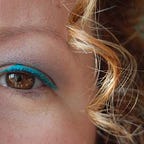Hive
By April Doyle
Full disclosure here — April and I follow each other on Twitter, we’re Facebook friends too, we have many mutual friends, and we even live near each other but we’ve never met in real life. When Hive came out I was thrilled and recommended the novel to my Book Club.
The novel is set in a near future dystopia where the bees have almost been killed off and the planet has warmed to an alarming temperature. It’s set in the South East of England, where April Doyle (and I) live, so although there are fictional towns and villages, it was fairly easy to recognise places. For me, that made the story far more chilling and prescient, certainly in the opening few chapters. It begins with Victor, a man whose job is to take his bee hives around to local farmers where they do their pollination work for a few days and then he moves them onto the next farm. He leaves his wife and two young daughters for weeks at a time to do this job and it’s not without danger as food has become scarce. Alongside this is Annie, a scientist who is working to protect and encourage bee numbers in the ‘simfields’ which are fields covered with a dome to ensure regular temperatures and biosecurity. Annie, under pressure from the local civil defence, takes her precious hives together with her small team of two assistants on Victor’s rounds as he and his family move into the old college buildings around the dome as his daughter grows weaker from malnutrition.
It’s a bleak story, and I won’t lie — I did have to start this novel twice because the first time I picked it up I couldn’t keep going as it was far too close to home, quite literally. However, I’m very glad I did pick it up again and keep going because all is not lost in Annie and Victor’s world. I won’t reveal the crucial plot-point that changes things, but Annie is forced to make contact with an old boyfriend who is working on tiny drones that can carry out the same work as the bees. Then it becomes a gripping race against time as an evil professor wants to stop them and capitalise on this amazing technology that could provide a timely stop-gap until bee numbers have recovered.
I’ve said this in my reviews before, but this is another great read that could so easily make a brilliant mini-series for television, and I urge the BBC (or a streaming company) to buy the rights and get on it immediately! Hive reminded me of the BBC’s 2008 sci-fi drama, Survivors but, unlike Survivors, this has a lower death count, and it’s probably more gritty and terrifying because our future is in the opening chapters of this book unless we begin to make real changes to our lives. If nothing else, do all you can to encourage bees, wasps, and other insect pollinators by growing flowers in your gardens, on your balconies, in your window-boxes. Support re-wilding projects that encourage native wildflowers, leave out saucers of water with a few stones in there so insects can safely get a drink, have grass instead of a plastic lawn (I mean, who on earth even allowed them?!).
Bees and wasps are our friends — the wasps just need a bit of extra personal space. Even horrible horse-flies have their place, which is anywhere so long as it’s not near me. I do want to see and hear buzzing in parks and gardens though, and this novel reminded me of how crucial those pollinators are to our own continued existence.
I bought my copy of Hive from Hive, funnily enough , but you can also get it from Bookshop.org too , or your local independent bookshop, or library, if you’re lucky enough…you know the drill.
